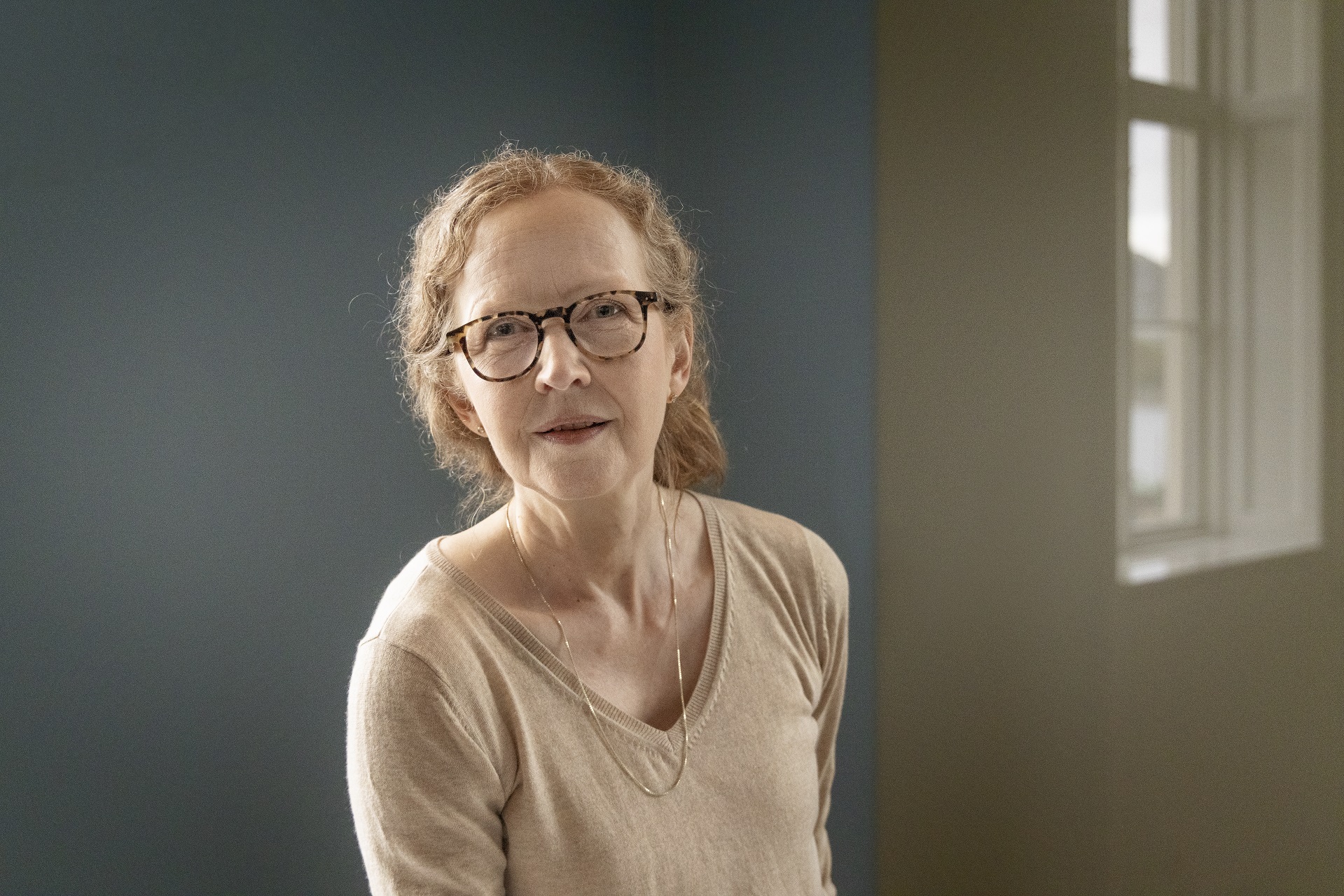About Hanne

My name is Hanne Jessen (she/her) and I am the founder of MIND THE MOMENT. Gestalt work is the third main endeavour in my career and the first where professional life and personal interests truly meet and create passion - about relationships and conversation, between people and within.
My background is in international business. A journey through a broad range of roles in large organisations and and across several countries. Always in the company of an unending appetite for learning and studying. Curious about the craft of my professions and that of 'being me, a human being'. The latter lead the way to psychology studies. And a few existential bumps in the road to psychotherapy training. Initially a means to sweep my emotional closet for ghosts when facing a cancer diagnosis, in case I didn't break survival statistics.
Still here, and so is the realisation, at the end of training, that Gestalt is too good not to be shared. So that's what I do, in private practice and in organisations.

My professional background
I work as a gestalt therapist and human resources professional.
The first part of my career was in frontline sales, marketing and product specialist roles, the second in human resources, as individual contributor and leader, within financial services and shipping.
My gestalt psychotherapist qualification is from Nordisk Gestalt Institut in DK, a 5-year programme approved by the Danish Psychotherapist Association.
I hold a master’s degree in business administration and have had fun at post graduate studies in coaching psychology and mindfulness-based approaches (a different MBA!), at yoga and mindfulness teacher trainings (plus a range of business training not included here). My gestalt and therapy training activities post qualification are listed below.
I used to seek immersion in a topic fuelled by curiosity more than the idea of applying it. Later, in the context of gestalt, I noticed seemingly separate pieces of activity come together, as when laying a puzzle. My delight was tangible, not least as I had just learned that ‘gestalt’ is the German word for ‘form’.
Taking form it certainly did, these flurries of interest and actions. As did I, when slowly daring to loosen the relentless strive for intellectual knowledge and control, attempts to quench private feelings of insecurity and doubt beneath a polished and successful exterior. When experiencing that ‘being’ tops all the ‘doing’ sometimes. That strength can be found in vulnerable, unpleasant places. I found an education par excellence in ‘being in the world’. I still read voraciously – and there is a different feel to it…
Training activities
- 2023/2024 – Relational Gestalt Therapy Theory & Practice – Advanced training programme – Pacific Gestalt Institute, US
- 2023/2024 – Facilitating group process in Gestalt – GATLA, US
- 2023 – Attachment and trauma – workshop – Miriam Taylor & Margherita Spagnuolo Lobb / Istituto di Gestalt, Italy
- 2023 – European Gestalt Therapy Training, 2 weeks Summer Residential – GATLA, Cyprus
- 2022/2023 – Applied Research in Psychotherapy Practice – Training programme – Danish Psychotherapist Association, DK / Crossfields Institute, UK
- 2022/2023 – Psychopathology of the Situation in Gestalt Therapy – Training programme – Margherita Spagnuolo Lobb / Istituto di Gestalt, Italy
- 2022 – Shame and dignity in the consulting room –Workshop – Lynne Jacobs / Istituto di Gestalt, Italy
- 2022 – Cape Cod Training Programme – Gestalt Internationally Study Center, US
- 2022 – Gestalt Couples Therapy – Workshop – Hanne Hostrup, DK
- 2022 – Comprehensive course in Interpersonal Neurobiology – Training programme – Daniel Siegel/Mindsight Institute, US
- 2021/2022 – Relational Interventions for New Psychopathologies in a Post-Pandemic World – Training programme – Margherita Spagnuolo Lobb / Istituto di Gestalt, Italy
- 2021 – Grief Therapy – Workshop – Maibritt Guldin/Danish Psychotherapist Association, DK
- 2020/2021 – Monthly supervision group meetings – GATLA Gestalt Associates Training Los Angeles / Liv Estrup, US
- 2020 – Gestalt Dream Therapy – Workshop – Joergen Groth / EFT Institute, DK
- 2019/2022 – Gestalt Training & Supervision Group – Bent Falk, DK
- 2019 – Gestalt Couples Therapy – Workshop – GATLA, Norway
- 2019 – European Gestalt Therapy Training, 2 weeks Summer Residential – GATLA Gestalt Associates Training Los Angeles, , Italy
CV
For more details about my education, certifications, memberships and business background, please click here.
My cultural background
A Danish national by birth, I have spent 15 years abroad, living and working in three different countries and travelling for work and studies in another 11. Swapping relatively small and homogenous Copenhagen for the multiculturally buzzing London and later Dublin was an education in itself. Having been a foreigner abroad, an expat and a returning native, I know the feelings that can arise when leaving family and familiar places behind. When arriving in a country that isn’t your own, the excitement, uncertainty and loneliness. And those that follow, perhaps surprisingly, when returning home to a country and culture that somehow no longer feels quite your own either. The joys of exploring the world at the risk of rootlessness.
Growing up, I thought my family, Danish white middleclass, was much like everybody else’s. That changed, over time and as I began to notice. Nationalities and skin colours blended, by adoptions and relationships. Divorces, deaths and broken families abounded, and had done also in earlier generations. Addictions, mental illness and suicide lived there too, as did the attempts hide and the silence when failing. Silent was also what my father had been, for decades until coming out as transgender, by now 25 years ago when such event was far from the order of the day. In and of themselves each potential sources of guilt, shame, fear, anxiety, which research nowadays confirms can travel across generations. And yes, I tapped into them all.
Unsettling as it was at the time, it came carrying gifts. Lessons in inclusion, diversity, connection and compassion, once a few significant people in my life helped digest the experiences. And, so it turns out, my family and route into life was pretty much like everybody else’s.


My stance towards working online
In today’s globalised and fast moving, online work has become a necessity and a help. Bridging distances and saving time in overfilled calendars – and it can be an option also when initiating a growth process.
I have good experiences working online. When meeting in person is difficult, online is better than not all. And I use it as a second option where therapy work is concerned.
At the core of what brings a person to therapy is often a lack of support in the past, which the therapist’s presence contributes to alleviating. Online work with its physical distance may not offer the same degree of ‘being here’ essential for feeling supported and helping overcome feelings of vulnerability. When possible, I recommend combining online and face-to-face sessions. And where a mix is not feasible, we will take care to include and address the felt experiences of ‘being at a physical distance’.
My work philosophy
I am borrowing, shortening and slightly rephrasing, from a book by gestalt therapist, philosopher and scholar Hans Peter Dreitzel in which he describes “What is Gestalt Therapy?” – I couldn’t have stated it as clear and eloquent:
- Gestalt therapy builds on your experience and our joint interpretations of it.
- It works with experiments; it does not use training exercises. The focus of experiments is how you are in contact with others, the environment or yourself; how you adjust your contact without being aware.
- It concentrates on your experience here-and-now rather than your discussions of there-and-then, since all experience, including remembering and learning, happens in the present.
- It trusts in the power of awareness, not in cognitive insight alone.
- It has a paradoxical relationship with change. If we accept ourselves, caringly aware of what we are now, growth flows by itself; if, however, we want to be different than we are, we stand in our own way.
- It assumes that our meeting can be a safe space for you to experiment; we have an authentic relationship, which enables me to see you as a whole person, someone who creatively adjusts to a situation and not just a carrier of symptoms. Where you can experience me as a person and not only as a professional concerned with diagnostics and deficits.
Reference: Dreitzel, H.P. (2021), “Human Interaction and Emotional Awareness in Gestalt Therapy”, Taylor and Francis, p.8.

